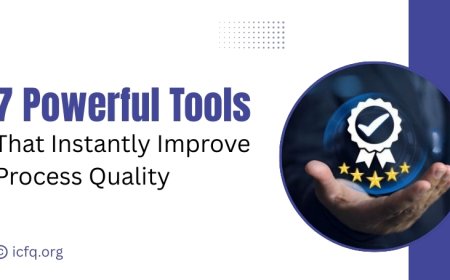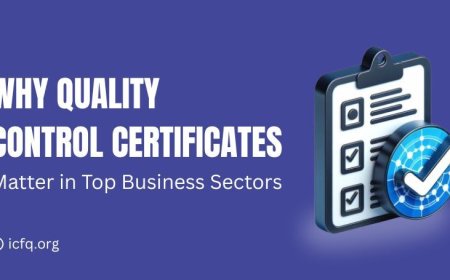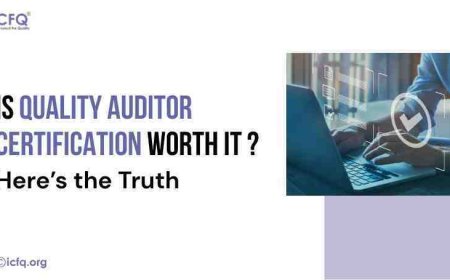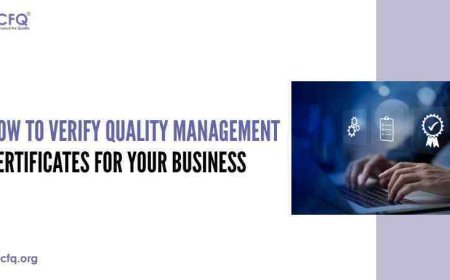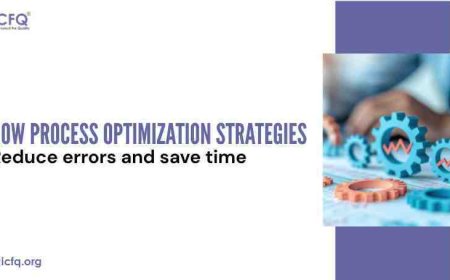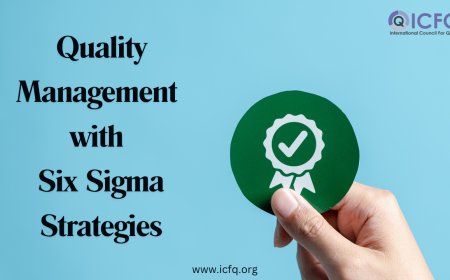Certified Excellence: Achieving Quality Management
Discover the path to certified excellence in quality management. Learn strategies, standards, and techniques to achieve superior quality in your organization.

Quality management certification is crucial in today's business world, ensuring that companies deliver high-quality products and services while striving for continuous improvement. It establishes trust and credibility and provides a competitive edge by demonstrating a commitment to excellence and continual improvement.
This certification shows that a company is dedicated to providing top-notch products and services, which boosts customer satisfaction and trust. Quality management helps companies be efficient, innovative, and grow sustainably. It also helps companies stand out from competitors and shows their commitment to getting better over time. In today's business environment, focusing on quality is key to success. It means making sure products meet customer needs and that processes run smoothly.
Role of Quality Management in Business Success
Quality management is essential for achieving business success by enhancing customer satisfaction, reducing costs, and improving operational efficiency. It fosters a culture of continuous improvement and innovation, driving long-term growth and sustainability. It's rooted in principles like customer focus, continuous improvement, and process efficiency.
Key Components of a Quality Management System:
-
Customer Focus: Understanding and meeting customer needs by listening to feedback and making sure products and services match what customers want keeps customers happy and helps the business grow.
-
Leadership: setting a clear direction for quality improvement and making sure everyone in the company knows what they need to do to achieve it. Good leadership inspires everyone to work together to make things better.
-
Employee Involvement: Getting employees involved in making things better by asking for their ideas, giving them training, and recognizing their efforts. When employees feel involved, they take pride in their work and contribute to improving quality.
-
Process Approach: Managing tasks as part of a bigger process to make sure everything runs smoothly and efficiently. By looking at how tasks are connected, businesses can find ways to improve the whole system.
-
Continuous Improvement: Always looking for ways to make things better, whether it's products, processes, or systems. This mindset of always getting better helps businesses stay ahead and meet changing customer needs.
-
Evidence-Based Decision Making: Making decisions based on facts and data instead of just guessing. By using evidence, businesses can make better decisions that lead to better outcomes.
-
Relationship Management: Building and maintaining good relationships with suppliers and partners to make sure everyone works together smoothly and achieves common goals.
Why is quality management certification important?
Quality management certification benefits both professionals and organizations. For individuals, it boosts skills and knowledge in quality management, enhances competitiveness in the job market, and paves the way for career growth. Certified professionals contribute to organizational efficiency, improved product quality, and heightened customer satisfaction. Additionally, certification serves as a mark of excellence, signifying a commitment to quality standards. This recognition builds trust with customers, partners, and stakeholders, reinforcing the organization's reputation for delivering top-notch products and services. Overall, quality management certification facilitates professional advancement and bolsters organizational credibility in the competitive business landscape.
Quality management certification encourages ongoing improvement within organizations, leading to better processes, products, and services. With effective quality management systems in place, companies can meet customer needs more effectively, boosting satisfaction and loyalty. Ultimately, certification in quality management helps businesses grow and succeed in a competitive market.
Types of Quality Management Certifications
Each type of quality management certification offers unique benefits and approaches to improving organizational quality and performance.
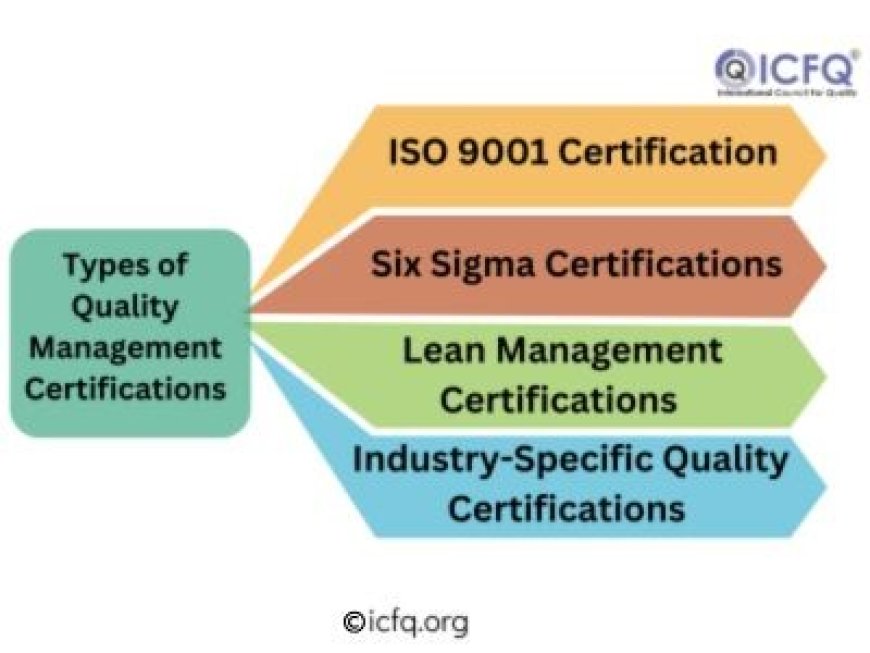
A. ISO 9001 Certification:
ISO 9001 is a globally recognized standard for quality management systems. It focuses on ensuring organizations meet customer requirements and enhance customer satisfaction through consistent product and service delivery.
B. Six Sigma Certifications:
Six Sigma certifications, including Green Belt and Black Belt, aim to improve processes by reducing defects and variations. These certifications equip professionals with problem-solving and data-driven methodologies to enhance quality and efficiency.
C. Lean Management Certifications:
Lean management certifications emphasize eliminating waste and optimizing processes to improve value delivery. These certifications focus on streamlining operations and maximizing customer value while minimizing resources.
D. Industry-Specific Quality Certifications:
Industry-specific quality certifications are tailored to the unique needs of particular sectors, such as healthcare, manufacturing, or automotive. These certifications address specific quality challenges and standards relevant to the industry, ensuring compliance and performance improvement.
How do I select the right quality certification?
A. Identifying Career Goals and Objectives:
Begin by clarifying your career aspirations and what you hope to achieve with the certification. Consider your desired role in quality management and how certification can support your professional development.
B. Researching Certification Options and Providers:
Explore various quality management certifications available in the market, such as ISO 9001, Six Sigma, and Lean Management. Research different certification providers to understand their reputation, credibility, and the quality of their programs.
C. Evaluating Program Content and Curriculum:
Assess the content and curriculum of each certification program to ensure it aligns with your learning objectives and career goals. Look for programs that cover relevant topics and provide practical knowledge and skills applicable to your desired role.
D. Considering Prerequisites and Requirements:
Review the prerequisites and requirements for each certification program, such as educational background, work experience, and examination criteria. Ensure you meet the eligibility criteria before committing to a certification path.
Preparation and Strategies for Success
Preparing for Quality Management Certification Exams involves getting the right study materials, like textbooks and online resources, to understand quality management concepts well. It's also crucial to practice with mock exams and quizzes to get comfortable with the test format and identify areas that need more focus. Real-world examples and case studies help apply theory to practical situations, making learning more effective.
Managing time and studying strategies are essential for success. Creating a study schedule, breaking down the material into smaller parts, and setting achievable goals help you stay organized. Using test-taking tips and managing stress are important during exams. Regularly reviewing key concepts and seeking support from peers or mentors can also boost confidence and motivation throughout the preparation journey.
Practical Uses of Quality Certification
Real-world applications of Quality Management Certification are evident through industry case studies and success stories, showcasing how organizations have implemented quality management principles to achieve notable results. These examples highlight the practical application of quality management in improving business processes and efficiency. Furthermore, quality management certification has a tangible impact on various sectors, including healthcare, manufacturing, and service industries. Through effective implementation, organizations can streamline operations, minimize waste, and enhance product or service quality, ultimately leading to increased customer satisfaction and organizational success.
Benefits of Quality Management Certification:
A. Career Advancement Opportunities: Quality management certification opens doors to career growth by demonstrating expertise in quality assurance and process improvement. It enhances credibility and positions individuals for higher-level roles within organizations.
B. Increased Employability and Marketability: Holding a quality management certification enhances job prospects and marketability. Employers value certified professionals for their ability to contribute to organizational success through effective quality management practices.
C. Enhanced Skills and Knowledge: Pursuing quality management certification equips individuals with practical skills and knowledge essential for managing quality processes and driving continuous improvement initiatives. It enhances problem-solving abilities and analytical skills, contributing to professional development.
D. Positive Impact on Organizational Performance: Quality management certification positively impacts organizational performance by fostering a culture of quality excellence. Certified professionals contribute to improved operational efficiency, product quality, and customer satisfaction, resulting in enhanced organizational effectiveness and competitiveness.
Challenges and Considerations:
Obtaining a quality management certification might be challenging. One problem is the amount of money required for study materials and exam costs. Also, finding time to study while juggling a job and other duties can take time and effort. There may also be barriers along this path, such as exam anxiety or difficulty understanding certain topics. However, by identifying these hurdles and remaining determined, you may overcome them and achieve your certification.
Quality management certification provides numerous advantages, including professional growth and greater marketability, but it also demands overcoming obstacles such as financial investment and time commitment. Pursuing certification is worthwhile despite these challenges because it leads to new opportunities and improves organizational performance. Individuals can overcome these obstacles and attain their certification goals through persistence and resilience. Maintain your focus on the final objective, remain committed to ongoing progress, and approach the road with positivity. Success in earning quality management certification is possible with patience and dedication.










